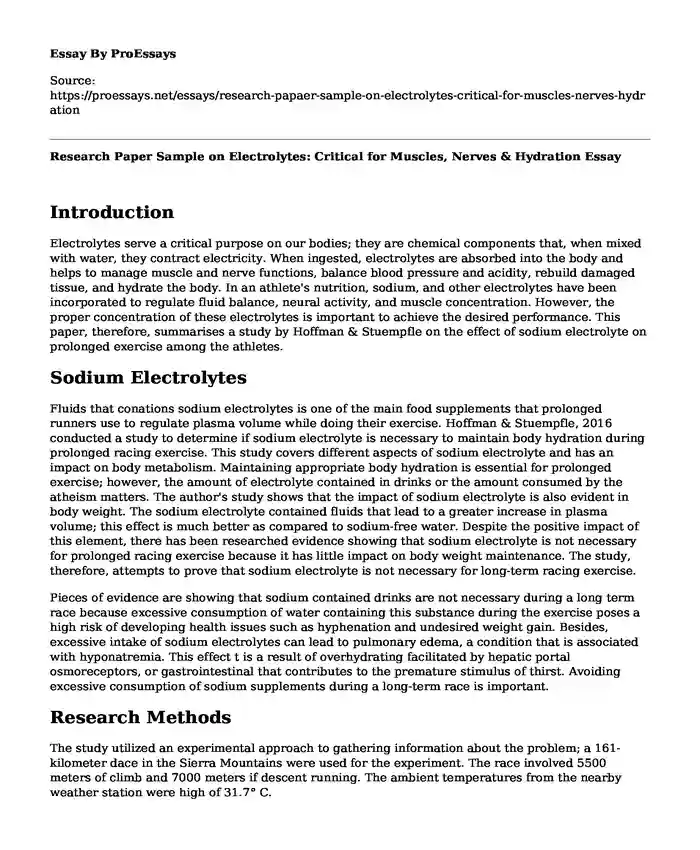Introduction
Electrolytes serve a critical purpose on our bodies; they are chemical components that, when mixed with water, they contract electricity. When ingested, electrolytes are absorbed into the body and helps to manage muscle and nerve functions, balance blood pressure and acidity, rebuild damaged tissue, and hydrate the body. In an athlete's nutrition, sodium, and other electrolytes have been incorporated to regulate fluid balance, neural activity, and muscle concentration. However, the proper concentration of these electrolytes is important to achieve the desired performance. This paper, therefore, summarises a study by Hoffman & Stuempfle on the effect of sodium electrolyte on prolonged exercise among the athletes.
Sodium Electrolytes
Fluids that conations sodium electrolytes is one of the main food supplements that prolonged runners use to regulate plasma volume while doing their exercise. Hoffman & Stuempfle, 2016 conducted a study to determine if sodium electrolyte is necessary to maintain body hydration during prolonged racing exercise. This study covers different aspects of sodium electrolyte and has an impact on body metabolism. Maintaining appropriate body hydration is essential for prolonged exercise; however, the amount of electrolyte contained in drinks or the amount consumed by the atheism matters. The author's study shows that the impact of sodium electrolyte is also evident in body weight. The sodium electrolyte contained fluids that lead to a greater increase in plasma volume; this effect is much better as compared to sodium-free water. Despite the positive impact of this element, there has been researched evidence showing that sodium electrolyte is not necessary for prolonged racing exercise because it has little impact on body weight maintenance. The study, therefore, attempts to prove that sodium electrolyte is not necessary for long-term racing exercise.
Pieces of evidence are showing that sodium contained drinks are not necessary during a long term race because excessive consumption of water containing this substance during the exercise poses a high risk of developing health issues such as hyphenation and undesired weight gain. Besides, excessive intake of sodium electrolytes can lead to pulmonary edema, a condition that is associated with hyponatremia. This effect t is a result of overhydrating facilitated by hepatic portal osmoreceptors, or gastrointestinal that contributes to the premature stimulus of thirst. Avoiding excessive consumption of sodium supplements during a long-term race is important.
Research Methods
The study utilized an experimental approach to gathering information about the problem; a 161-kilometer dace in the Sierra Mountains were used for the experiment. The race involved 5500 meters of climb and 7000 meters if descent running. The ambient temperatures from the nearby weather station were high of 31.7° C.
Participants were race starters who were invited to take part in the study; the Institutional Review Boards validated this experiment. The procedure was followed to ensure that the desired outcomes were achieved. Bodyweight of all the participants was measured one day before the race, at 125 km, and after completing the race. All runners were not allowed to use hydration vests. Participants were required to fill in a postrace questionnaire; reminder emails were used to alert participants who had not completed the questionnaire. The questions examined about racing and training background, it also inquired about the fluid intake, drinking schedule, and trend in body weight. To determine hydration status, body weight measured at the start of the race was used.
Results
The race coasted of 376 athletes, 296 (78%) finished the race, and 233 of the finishers completed the questionnaire. 25.3% of the sample were overhydrated, 17.2% dehydrated, and 57.7% dehydrated. 93.6% of the finishers who were using sodium contained drinks appeared to be 100% overhydrated, 90% dehydrated, and 91.8% dehydrated finishers. Intake of water containing sodium electrolyte was different among groups of runners. The amount was high for those who were over dehydrated and ked to weight gain. Finishers, who used no sodium contained water during all segments of the race, finished with a slight decrease in body weight.
Discussion
The main finding in this study is that the relationship between the amount of sodium intake and the body weight in that participants who took excessive sodium maintained greater proportions of initial body weight as co pared to those who consumed sodium-free supplements. The study also identified that the participants who utilized sodium supplements in every segment of the race maintained higher body weight than those using fewer amounts of sodium supplements. The findings in this study show that sodium electrolytes can be consumed by runners when there is a need to maintained body weight during prolonged exercise rather than hydration purposes.
Conclusion
The relationship between the two variables is significant; it is, therefore, important to know that sodium supplements account for weight change in a greater percentage. Excessive use of sodium-based supplements is likely to cause an unnecessary weight gain among the runners as well as low weight loss during an exercise. This study support that sodium electrolyte is not a key factor to consider for hydration status, nor is it necessary to maintain appropriate hydration in a long-term exercise in a hot weather condition. The study was successful; however, there were limitations because of restraints resulting from performing a competitive exercise.
References
Hoffman, M. D., & Stuempfle, K. J. (2016). Is sodium supplementation necessary to avoid dehydration during prolonged exercise in the heat? The Journal of Strength & Conditioning Research, 30(3), 615-620.
Cite this page
Research Paper Sample on Electrolytes: Critical for Muscles, Nerves & Hydration. (2023, Nov 06). Retrieved from https://proessays.net/essays/research-papaer-sample-on-electrolytes-critical-for-muscles-nerves-hydration
If you are the original author of this essay and no longer wish to have it published on the ProEssays website, please click below to request its removal:
- Animals Rights and Wrong by Rodger Scruton Essay Example
- Animal and Ethics Essay Example
- Animal Abuses Essay Example
- Research Paper on Uniting to Thwart the Worldwide Extinction Crisis
- Essay Example on Zoos and Aquariums: Protecting Animals and Improving Lives
- Essay Example on Science: Making the World a Better Place
- Saving Endangered Tigers: Population Decreasing Despite Global Efforts - Essay Sample







